PEOPLE OF ACTION

THE SECOND HALF OF THE 20th CENTURY
CONTENTS
 The
United States The
United States
 The
Soviet Union / Russia The
Soviet Union / Russia
 Great Britain Great Britain
 France France
 Germany Germany
 Other
European Community Nations Other
European Community Nations
 The
English-Speaking Commonwealth The
English-Speaking Commonwealth
 Poland Poland
 Other
East European or Warsaw Pact Nations Other
East European or Warsaw Pact Nations
 The Vatican The Vatican
 Latin
America Latin
America
 Japan Japan
 China China
 India India
 Other
Asia Other
Asia
 Middle
East Middle
East
 Sub-Saharan
Africa Sub-Saharan
Africa
 The
United Nations The
United Nations
 The Second Half of the 20th Century: The Second Half of the 20th Century:
A Full History
Joe
McCarthy (1953-1954)

1909-1957.
A Senator from Wisconsin in the early
in1950s, who, in a Congressional committee that he himself directed, made
wild accusations against an ever-growing list of people – in the American
government as well as outside of it – of being communist or pro-communist.
He himself was being investigated
for financial fraud in late 1951 – and fearing his non-reelection to the
Senate in 1952 he took up the anti-communist tirade as a way of drawing
fire away from himself and toward others. Once having made the claim
of possessing a list of known communists in the State Department that he
himself was going to expose (he never did reveal who those might be) he
took up in early 1953 his attacks in order to made good some of his claim
of being the country's best anti-communist crusader.
For a while he terrorized the Eisenhower
Administration – claiming that a number of Eisenhower's diplomatic appointees
had communist connections (as vaguely defined by McCarthy). Then
in April and May of 1954 he even took on the US Department of Defense,
claiming that it was widely infiltrated by pro-communist insiders.
His accusations became so outrageous that he finally embarrassed himself
before the new TV-viewing public and gave the Senate an opportunity to
silence him in December with a motion of censure for his behavior.
In the meantime McCarthy presented
American politics with a new name for the technique of attempting to intimidate
or destroy your political opponents by accusing them of being soft on communism:
"McCarthyism."
 Dwight
D. Eisenhower Dwight
D. Eisenhower
1890-1969. President of the United
States, 1953-1961.
Supreme Commander of the Allied Forces
in Europe (1942-1945).
John Foster Dulles
(1953-1959)
1888-1959. Secretary of State,
1953-1959.
A militant anti-Communist and even
an anti-neutralist who viewed the Cold War between the United States and
the Soviet Union (Russia) as a great moral crusade of good against evil – in
which there could be no neutral ground.
 John
F. Kennedy John
F. Kennedy
1917-1963. United States President,
1961-1963.
 Martin
Luther King, Jr. Martin
Luther King, Jr.
1929-1968.
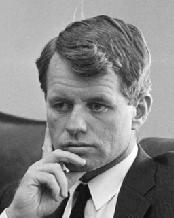 Robert
F. Kennedy (1961-1968) Robert
F. Kennedy (1961-1968)
1925-1968.
 Robert
Kennedy's major works or writings: Robert
Kennedy's major works or writings:
The Enemy Within
(1959)
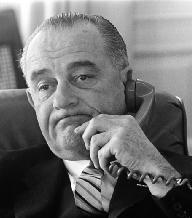 Lyndon
B. Johnson (1963-1969) Lyndon
B. Johnson (1963-1969)
1908-1973.
United States President, 1963-1969.
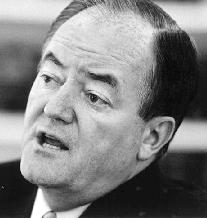 Hubert
Humphrey Hubert
Humphrey
 Richard
M. Nixon Richard
M. Nixon
1913-1994. United States President,
1969-1974.
 Nixon's
major works or writings: Nixon's
major works or writings:
The Memories of Richard
Nixon (1978)
The Real War (1980)
Beyond Peace (1994)
 Henry
A. Kissinger (1969-1977) Henry
A. Kissinger (1969-1977)
1923- .
National Security Advisor (1969-1973)
and Secretary of State (1973-1977) under the Presidential Administrations
of Nixon and Ford.
 Kissinger's
major works or writings: Kissinger's
major works or writings:
Nuclear Weapons and
Foreign Policy (1957)
The Necessity for Choice
(1960)
American Foreign Policy
(1969)
The White House Years
(1979)
For the Record (1981)
Nelson Rockefeller
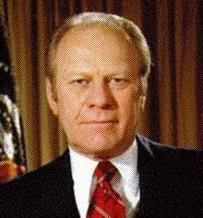 Gerald
Ford Gerald
Ford
1915- . United States President,
1974-1977.
 Jimmy
Carter Jimmy
Carter
1924- . United States President,
1977-1981.
Paul Volcker
 Ronald
Reagan Ronald
Reagan
1911- . U.S. President, 1981-1989.
Bob Dole
 George
Bush George
Bush
1924- .
 Bill
Clinton Bill
Clinton
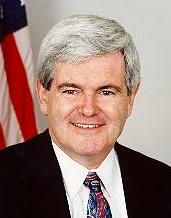 Newt
Gingrich Newt
Gingrich
1943- .
 Bill
Gates Bill
Gates
1955- .
 Gates'
major works or writings: Gates'
major works or writings:
The Road Ahead
(with Nathan Myhrvold and Peter Rinearson,1995)
|
THE
SOVIET UNION / RUSSIA |
Nikita
Khrushchev (1953-1964)
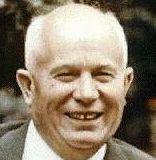 1894-1971. 1894-1971.
Became First Secretary of the Communist
Party shortly after Stalin's death in 1953. In 1957 he ousted his
colleague Nikolai Bulganin and took for himself the State position as Premier,
thus holding the top party and state posts.
But his diplomatic miscalculations
in placing Soviet missiles in Cuba in 1962 – and then having to remove them – and
the worsening performance of Soviet agriculture and industry under his
leadership finally led to his ouster in October of 1964.
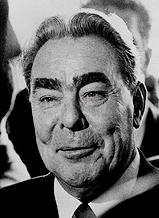 Leonid
Ilyich Brezhnev (1964-1982) Leonid
Ilyich Brezhnev (1964-1982)
(1906-1982)
The honorary
"President" of the USSR, 1960-1964 under Khrushchev. With the ouster
of Khrushchev in 1964, he was elevated to the all-important Communist Party
position of First Secretary (later General Secretary) – a position he would
hold until his death in 1982. In 1977, upon the ouster of his collegue
Nicolay Podgorny he once again took up the position of President of the
USSR – combining supreme positions in both the state and party.
Author of the
"Brezhnev Doctrine," which affirmed the USSR's right to intervene in the
political affairs within any country within the Soviet bloc when Moscow
perceived that the country was threatened by anti-socialist forces – as
was the case in 1968 in Czechoslovakia, when that country started to show
signs of a drift away from Russian domination.
Alexei Kosygin
(1964-1980)
1904-1980.
Soviet Premier: President of
the Soviet Council of Ministers, 1964-1980. Kosygin was part of a
Soviet triumvirate composed of Brezhnev, Podgorny, and himself which jointly
ruled the Soviet Union – though Brezhnev's position was paramount, becoming
even moreso as the 1970s advanced.
Nikolay V. Podgorny
(1964-1977)
1903-1983.
Podgorny was Secretary of the Central
Committee of the Communist Party of the Soviet Union, 1963-1965.
But he was deposed from this key position in a power struggle with Brezhnev.
Nonetheless, he was granted the lesser position of Chairman of the Presidium
of the Supreme Soviet, 1965-1977, and supposedly formed part of a joint
rulership of Brezhnev, Kosygin and himself. In 1977 he was ousted
from this state position as Brezhnev took it for himself.
Mikhail
Sergeyevich Gorbachev (1985-1991)

1931- .
A Communist Party bureaucrat with
a specialization in economic matters, in 1980 he was brought into the inner
circle of Soviet politics (the Politburo) as a protege of Yuri Andropov.
When Andropov became Soviet leader Gorbachev was placed in charge of the
stumbling Soviet economy.
In 1985 Gorbachev became Soviet leader
and party chief as the Communist Party General Secretary. He removed
old party economic planners and replaced them with younger, reform-minded
economic ministers, ones willing to work with his program of liberalizing
the Soviet economy (perestroika) and culture (glasnost).
This liberalization extended to the
lightening of the military hand of the Soviet Union on its neighbors – both
in Asia (Afghanistan) and in Eastern Europe (the entire Soviet bloc) – in
order to relieve the Soviet economy of the huge economic burden of maintaining
such a huge an imperial presence at a time when its own economy was collapsing
under years of State planning. In 1989 he pulled the Soviets out
of Afghanistan – and let an independence-minded Eastern Europe go its own
way – much to the amazement of everyone.
Further internal reforms to reduce
the Party's grip on the Soviet economy did little to breathe new life into
the Soviet economy and disillusionment set in against his leadership.
Old-guard communist officers staged an attempted military coup against
him in August of 1991. Though the coup failed – popular support shifted
to the Russian President Boris Yeltsin. With Gorbachev's dissolution
of both the Communist Party and the Soviet Union in late 1991, he no longer
held any real political offices – and simply retired from Russian politics.
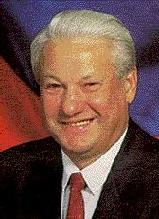 Boris
Yeltsin (1991- ) Boris
Yeltsin (1991- )
1931- .
Russian President, 1991- .
Elected to that position in 1991 and again in 1996, despite rumors of his
worsening health and despite the miserable showing of Russian troops in
the Chechnya war and the very obvious deterioration in the Russian economy.
|
|
Anthony Eden
Conservative Party. British Prime
Minister, 1955-1957
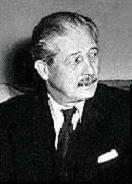 Harold
Macmillan Harold
Macmillan
1894-1986. Conservative Party.
British Prime Minister, 1957-1963.
Alec Douglas-Home
1903-1995. Conservative Party.
British Prime Minister, 1963-1964.
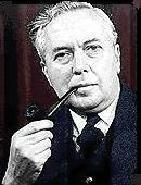 Harold
Wilson Harold
Wilson
1916-1995). Labour Party.
British Prime Minister, 1964-1970 and 1974-1976.
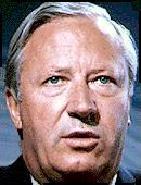 Edward
Heath Edward
Heath
1916- . Conservative Party.
British Prime Minister, 1970-1974.
James Callaghan
1912- . Labour Party. British
Prime Minister, 1976-1979.
 Margaret
Thatcher (1979-1990) Margaret
Thatcher (1979-1990)
1925- . Conservative Party.
British Prime Minister, 1979-1990. Led the British to victory over
Argentina in the 1982 Falkland Islands War.
 John
Major John
Major
1943- . Conservative Party.
British Prime Minister, 1990-1997.
 Tony
Blair Tony
Blair
1953- . Labour Party. British
Prime Minister, 1997- . |
|
Pierre Mendes-France
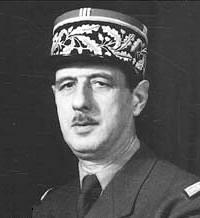 Charles
De Gaulle (1940-1969) Charles
De Gaulle (1940-1969)
1890-1970.
Georges Pompidou
Giscard-d'Estaing
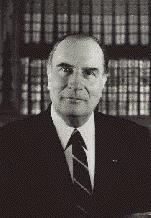 François
Mitterand (1981-1995) François
Mitterand (1981-1995)
1916-1996.
President of France, 1981-1995 (two
terms; he also ran as the Socialist candidate for President in 1965 and
1974, coming close to victory both times).
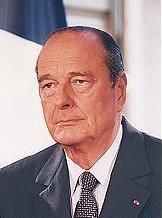 Jacques
Chirac Jacques
Chirac
1932- .
Gaullist. President of France
since 1995 (defeating Lionel Jaspin in a fairly close election).
French Prime Minister, 1974-1976 and 1986-1988. |
|
Konrad
Adenauer (1949-1963)
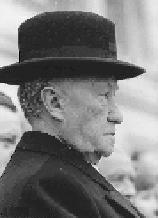
1876-1967. He was born in
Cologne, Germany. He studied in Freiburg, Munich and Bonn – eventually
returning to Cologne to begin practicing law there. In 1917 he was
elected Burgomeister (Mayor) of Cologne. During the early years of
the Weimar Republic after World War One he was an active member of the
Catholic Center Party and was elected to the Provincial Diet (Legislature)
and to the Prussian State Council. Of the last-mentioned, he served
as President from 1920 until 1933. A Nazi takeover of power in Germany
forced him from that position. The following year he was imprisoned – and
also again in 1944.
This record of opposition to the
Nazis was to stand hinm in good stead for political service in post-war
Germany. Once again he became mayor of Cologne. He also took
the leading role in founding the Christian Democratic Union – a centrist
party of Christian values pleasing to both the occupying authorities – and
to the German electorate. In 1949 he was named as Chancellor (Prime
Minister), and was reelected to that office again after national elections
in 1953 and 1957.
He attempted to restore German dignity
by putting the country in loyal service to the United States during the
Cold War. He hoped that this would be rewarded by equally strong
backing by the United States for the reunification of Germany – by ending
the Communist rule in East Germany and the return of the whole country
under the free-democratic government of West Germany.
But when Kennedy did nothing to stop
or respond to the building of the Berlin Wall, which only isolated East
Germany all the more from the West, Adenauer began to distance himself
somewhat in this pro-American relationship. He began to appear in
close harmony with Charles de Gaulle in the early 1960s – as de Gaulle took
on a more strident anti-American foreign policy.
This raised complaints in Germany
that Der Alte or "Old One" was in fact losing touch with reality.
In 1963 Adenauer thus stepped down from his party offices and retired to
private life. he died in 1967.
Ludwig Erhard
1897- . German
Chancellor, 1963-1966.
Kurt Georg Kiesinger
1904 - . German Chancellor, 1966-1969
Willy Brandt
1913- . German Chancellor,
1969-1974
Helmut Schmidt
1918- . German Chancellor,
1974-1982.
Helmut Kohl
(1982-1998)
1930- . German Chancellor,
1982-1998
Gerhard Schröder
(1998- )
German Chancellor, 1998- . |
OTHER
EUROPEAN COMMUNITY NATIONS |
THE
ENGLISH-SPEAKING COMMONWEALTH |
Robert
Menzies (1949-1966)
1894-1978.
(Liberal) Australian Prime Minister,
1949-1966.
Malcolm Fraser
(1975-1983)
1930- .
(Labor) Australian Prime Minister,
1975-1983.
Bob Hawke (1983-1991)
1929- .
(Labor) Australian Prime Minister,
1983-1991.
 Paul
Keating (1991-1996) Paul
Keating (1991-1996)
1944- .
(Labor) Australian Prime Minister,
1991-1996.
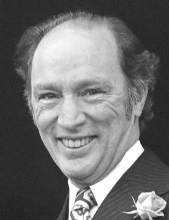 Pierre Trudeau (1968-1979 and 1980-1984) Pierre Trudeau (1968-1979 and 1980-1984)
1919-2000.
(Liberal) Canadian Prime Minister, 1968-1979 and 1980-1984.
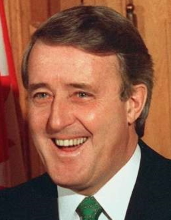 Brian Mulrooney (1984-1993) Brian Mulrooney (1984-1993)
1939- .
(Liberal) Canadian Prime Minister
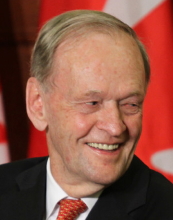 Jean Chrétien (1993-2003) Jean Chrétien (1993-2003)
1934- .
(Liberal) Canadian Prime Minister,
1993-2003.
|
|
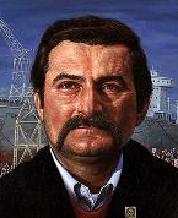 Lech
Walesa Lech
Walesa
|
OTHER
EAST EUROPEAN NATIONS |
Marshall
Tito
Nicholas
Ceaucescu
|
|
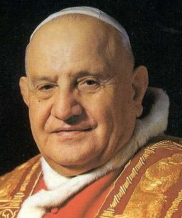 John XXIII John XXIII
pope: 1958-1963.
Angelo Guiseppe Roncalli (1881-1963). An Italian (unexpectedly
elected on the 11th ballot) who called into session the Second Vatican
Council in 1962. Previously, as papal nuncio, he worked hard to
save war refugees, most notably Jewish refugees of all national
varieties. He was also a strong supporter of the new state of
Israel.
He believed strongly in the equality of all before
God ... was very interested in ecumenical work with other Christian
faiths and worked hard to bridge political and religious
divisions. He named the first non-European cardinals ... selected
from Africa, Japan and the Philippines. He died soon after the
start of the Second Vatican Council ... shutting it down (temporarily).
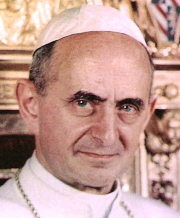 Paul VI Paul VI
pope: 1963-1978.
Giovanni
Battista Enrico Antonia Maria Montini (1897-1978). An Italian who
reconvened and continued the work of the Second Vatican Council ...
completing it in 1965. He was interested in improved relations
with the Eastern Orthodox and Protestant churches. He was
strongly Marian ... naming Mary as the Mother of the Church. In
his 1968 encyclical Humanae vitae, he held to the church’s traditional stand on marriage, birth control, etc.
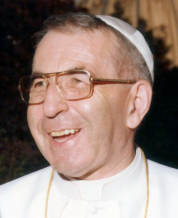 John Paul I John Paul I
pope: 1978.
Albina
Luciani (1912-1978). An Italian who really did not want the
position ... and died only 33 days on the job! A very kind
individual.
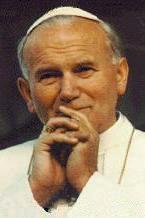 John Paul II John Paul II
pope: 1978-2005.
Karol
Jozef Wojtyla (1920-2005). Polish (first non-Italian since the
1500s). Conservative in terms of issues debated in the church ...
though quite open to improved relations with Judaism, Islam, and
Eastern Orthodoxy. He was quite outspoken in his opposition to
Communist rule in Poland. He also beatified 1,344 and canonized
483 people ... more than the combined total of all of his predecessors
|
 Fulgensia Batista Fulgensia Batista
Fidel Castro
Papa Doc Duvalier
Anastasio Somoza
Fernando Henrique
Cardoso
President of Brazil, 1994 to the present.
Widely appreciated as having brought Brazil's soaring inflation under control.
Alberto Fujimori
Hugo Banzer
Bolivian General and dictator of Bolivia,
1971-1978. Present elected civilian President of Bolivia.
Alfredo Stroessner
Dictator of Paraguay, 1954-1989.
Juan Peron
Augusto Pinochet
1916- .
Chilean General who seized power
in Chile in 1973 and ran that country as a dictator until 1990. In
1990 he returned power to a civilian government but stayed on as army commander.
In March of 1998 he resigned his military position to become a senator
for life. In October 1998 he was arrested while in England (for medical
reasons) in response to the orders of a Spanish court which claimed jurisdiction
to try him for his political crimes.
Eduardo Frei
President of Chile. |
|
Emperor Michinomiya
Hirohito (1926-1989)
1901-1989.
Emperor, 1926-1989.
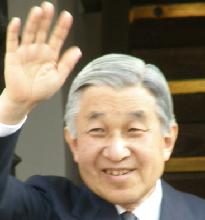 Emperor
Tsugu Akihito (1989- ) Emperor
Tsugu Akihito (1989- )
1933- .
Emperor, 1989 to the present.
|
 Mao
Zedong Mao
Zedong
1893-1976.
Deng Xiaoping
1904-1997.
Began the liberalization of the Chinese
economy in 1978.
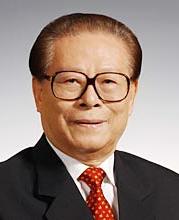 Jiang
Zemin Jiang
Zemin
1926- .
President of China, 1993-2003.
General Secretary of the Chinese Communist Party, 1989-2002.
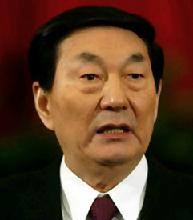 Zhu
Rongji Zhu
Rongji
1928- .
Prime Minister of China, 1998-2003. |
|

Jawaharlal Nehru
(1947-1964)
1889-1964.
Head of the Indian Congress Party
and Indian Prime Minister, from India's independence in 1947 until his
death in 1964.
Indira Gandhi
(1966-77; 1980-84)
1917-1984.
Daughter of
Jawaharlal Nehru (no relation to Mahatma Gandhi; "Gandhi" was her married
name). At the death of her father in 1964 she became head of the
Indian Congress Party. Two years later she became Indian Prime Minister,
serving during the periods 1966-1977 and 1980-1984. She died
in office at the hands of a Sikh assassin.
Sanjay Gandhi
1946-1980.
The younger son of Indira and Feroze
Gandhi. He became very active in his mother's cabinet – one of the
more radical voices in her government and perhaps the driving force behind
her national state of emergency, 1975-1977. It was clear that he
was being groomed to inherit the political "dynasty" begun by his grandfather,
Jawaharlal Nehru, when Sanjay died in a plane crash in 1980.
Rajiv Gandhi (1984-1989)
1944-1991.
Head of the Indian Congress Party,
1984-1991, and Indian Prime Minister, 1984-1989.
Rajiv was the older son of Indira
and Feroze Gandhi. Rajiv was quite content to let his younger brother
Sanjay take the lead in promoting the family's political fortunes – until
his brother's death in 1980. At this point Rajiv was brought forward to
take his brother's political place. When his mother was assassinated
in 1984 Rajiv Gandhi was immediately appointed head of the Indian Congress
Party and became India's new Prime minister.
His governance was not strong and
he was not effective in handling two of India's major regional problems:
separatism in the Punjab and in Kashmir. His governemnt was also
plagued by financial scandals – and in 1989 he stepped down as Indian Prime
Minister.
He remained head of the Indian National
Congress – and in 1991, as he was campaigning in South India, he was assassinated
by a woman with possible (but unproved) links to a radical Tamil separatist
group. |
|

Chiang Kai Shek
Syngmun Rhee
Kim Dae Jung
Kim Il Sung
Ferdinand Marcos
 Ho
Chi Minh (1941-1969) Ho
Chi Minh (1941-1969)
1890-1969.
Ngo Den Diem
Prince Norodim
Sihanouk
Pol Pot
Hun Sen
Sukarno
Suharto
 Tenzin Gyatso - The Buddhist Dalai Lama (since 1940) Tenzin Gyatso - The Buddhist Dalai Lama (since 1940)
1935- . Born in Tibet as Lhamo Thondup. Went into exile in 1959 due to the Chinese Communist takeover of Tibet.
|

Shah Reza Pahlavi
of Iran
Ayatollah Ruhollah
Khomeini (1979-1989)
Ayatollah Ali
Khamenei
Muhammad Khatami
President of the Islamic Republic (Iran),
1997- .
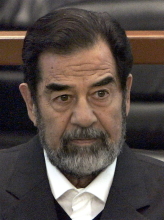 Saddam Hussein Saddam Hussein
1937- .
President of Iraq and leader of the
Baath Party in Iraq.
Hafez Assad
King Hussein of
Jordan
Yassir Arafat
1929- .
Palestinian Leader.
David Ben Gurion
(1948-53, 1955-63)
1886-1973.
Levi Eshkol (1963-1969)
1895-1969.
Golda Meier (1969-1974)
1898-1978.
Yitzhak Rabin
(1974-77; 1992-95)
1922-1995.
Menachem Begin
(1977-1983)
1913-1992.
Shimon Perez (1984-86;
1995-96)
1923- .
Binyamain Netanyahu
(1996-1999)
1949- .
King Faisal of
Saudi Arabia
Gamel Abdul Nasser
Anwar Sadat
Hosni Mubarak
Muammar Qaddafi
King Hassan
of Morocco (-1999)
|
|

Ras Taffari Haile
Selassie
1891- . Emperor of Ethiopia, 1930-
(but exiled by the Italian authorities, 1936-1941).
Mengistu Haile
Mariam (1974-1991)
Marxist dictator who overthrew the rule
of Emperor Haile Selassie in 1974. He was forced out of power in
1991 and is in exile in Zimbabwe.
Kwame Nkrumah
(1960-1966)
1909- . First President of the
Republic of Ghana.
Jomo Kenyatta
1893- .
Anthropologist, teacher, leader of Kenyan independence movement and first
President of the Repubic of Kenya.
Daniel arap
Moi
President of Kenya
Idi Amin
General and dictator of Uganda, whose
regime killed approximately 300,000 people. Now in exile in Saudi Arabia.
Mobutu Sese
Seku
Robert Mugabe
President of Zimbabwe.
Hendrik Frensch
Verwoerd (1949-1966)
1901-1966. Born in the Netherlands.
Major architect of the
apartheid (separateness) policy undertaken
after the electoral victory of the National Party in 1949. Became
South African Prime Minister, 1958-1966.
Pieter
W. Botha
F.W. de Klerk
(1988-1994)
President of South Africa, -1994.
Desmond
Tutu
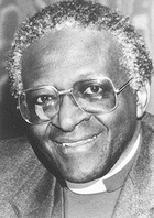
Anglican Archbishop.
Winner of the 1984 Nobel Peace Prize.
Long-time leader
in the battle against the Afrikaner policy of
apartheid.
Chairman of
the South African Truth and Reconciliation Commission (created in 1995)
that called upon South Africans of all races to step forward and admit
their roles in the racial turmoil of the 1949-1994 apartheid era – as part
of a national healing process. The fact that Tutu did not spare Black
perpetrators of violence, even though the violence was done in the name
of liberation, was itself a point of deep tension between Tutu and the
ANC.
 Nelson
Mandela (1994-1999) Nelson
Mandela (1994-1999)
1918- . President of the Republic
of South Africa from 1994 to 1999

 Mandela's
speeches: Mandela's
speeches:
"No Easy Walk to Freedom"
Presidential Address (1953)
"I am Prepared to Die" (Nelson
Mandela's statement from the dock)
(from the Rivona Trial)
Freedom (reflections just
prior to release from prison)
Nelson Mandela: Inaugural Address,
May 10, 1994
|
|
Dag Hammarskjold
1905-1961. Swedish statesman.
United Nations Secretary-General, 1953-1961.
Winner of Nobel Peace Prize in 1961
(working to settle the Congo crisis that marched the world up to the brink
of war between the Soviet Union and the United States). Was killed
when his plane crashed while on a diplomatic peace mission in Africa in
1961.
U Thant
|
THE SECOND HALF OF THE 20th CENTURY:
A FULL HISTORY |
 Miles
H. Hodges Miles
H. Hodges
| | | | |

